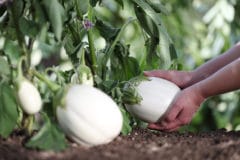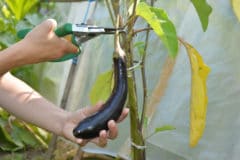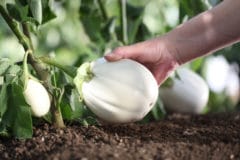When Is Eggplant Ripe?
If you’ve planted your eggplants in warm, well-drained soil, and the weather is warm, your eggplants should ripen without any trouble. When harvesting your eggplants, you want young, immature fruit because they have the best flavor. If they grow too large, they lose flavor and become spongy inside. You can determine if you’re eggplants are ripe if they have the following features:
- Deep purple color
- Firm skin
- Glossy skin
When to Ripen Eggplant Indoors
Uneven ripening or failure to ripen can happen to eggplants when planting too late in the season, overcrowding plants or exposing to cool temperatures. You can ripen eggplants after harvesting, but results vary, depending on the problem. Ripen them on the counter at room temperature. It helps to put the eggplants in a paper bag where they should ripen within a few days.
How to Speed up the Ripening Process
You can speed up the process by placing apples, bananas and tomatoes next to the eggplant. These fruits produce ethylene, which causes fast ripening in eggplants. The problem is that ethylene also causes eggplants to rot quickly, so you might have to experiment with the timetable.
If they start to get dull and mushy, then it’s better to discard them because they will become bitter, and unsuitable for eating.
Young Eggplant Has the Best Flavor
Eggplants you see in the grocery store are often too large. They may look fine on the outside, but they get bitter if they reach full maturity. Remember to pick your eggplants before they actually mature. You want them to be young and firm with tender flesh on the inside. There’s no need to ripen young eggplants if they’re large enough to use.












